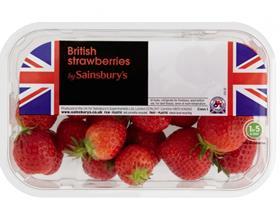
Citizens in the UK go to the polls this Thursday to vote on whether to remain in or to leave the European Union. While many will make their decision based on ideals about democracy or fears on immigration, food will no doubt be a key factor, not least due to the UK’s heavy reliance on other EU members for imports, especially of fruit and vegetables.
The UK produces less than 60 per cent of what it consumes, with a huge food gap of £21bn (€27bn). This will not be helped by leaving the EU, analyst Euromonitor predicts, with import costs expected to rise as the value of the pound sterling falls. A UK exit from the EU would also trigger the need to renegotiate a heap of contracts and trade deals with other countries. But these are the only near-certainties of a Brexit.
“It is difficult to predict the consequences, whether short-term or long-term,” concurred Jo Lambrecht, commercial manager at Belgian cooperative BelOrta. “It will probably make trade harder. A lot will depend on the protocols and procedures that can be agreed between the UK and the EU. It is too early to say. There are other European countries that aren’t members of the EU and we send there, so exports will definitely go on.”
Tom Premereur of Belgian auction REO Veiling revealed that he anticipated a devaluation of the British pound as a result of an exit. “That would make our products more expensive to UK consumers, which would make exporting more difficult,” he said.
“We cannot say what the eventual impact on the market will be,” added one major Dutch importer. “What will the currency do? Will a new trade agreement be effective? We don’t know. What we do know is that the market has always presented us with some challenges and we have never stepped away from them. We will adapt to any changes on the market and assist retailers in supplying them with the perfect product. The UK market is too important for the EU, so things will go on.”
Marc Peyres of French apple and kiwifruit exporter Blue Whale agreed that the UK market was too important to be suddenly neglected. In the short term, he expected some fluctuations in the currency, but medium term, he believed trade would return to a normal level.
“What is sure is that, even if the UK chooses to leave the EU, it will still be at the other side of the Channel Tunnel,” he said. “That’s only 40km from the continent! And UK consumers will still be hungry, of course.”
But even if trade is able to continue as normal, UK farmers remain concerned about losing financial support through the EU’s common agricultural policy.
“Our farmers are very nervous about the levels of support they would get if we came out,” Meurig Raymond, president of the National Farmers’ Union, told ThisIsMoney.co.uk. “Without any support we would be at such a huge disadvantage to our European rivals. We’ve got Ireland to the west of us; we’ve got Holland to the east; there’s France, Sweden, Germany, and farmers in these countries could be receiving support to a far higher level than we would in the UK. It would make us uncompetitive, unable to invest for the future. Our self-sufficiency in food would be at risk and it has already been falling for the last 30 years.”
A UK exit from the EU would also put an end to the free movement of labour between the UK and the EU, a huge potential problem when it comes to the main harvesting periods.
“The farming community desperately needs that seasonal workforce for fruit picking, vegetable harvesting and so on,” said Raymond. “Today it’s not just the picking, it’s a lot of the work in the packhouses and the food processing industry, as well as the harvesting, that is very dependent on eastern European labour – so what happens if we pull out? We could easily destroy an extremely important part of British farming by restricting the availability of labour.”



